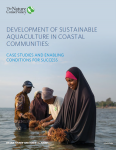Aquaculture
We face an unprecedented challenge ahead. How can we feed a growing world population in the face of decreasing wild fish stocks and increasing environmental impacts from our current food systems? Most importantly, how do we do so in a way that is environmentally sustainable and that benefits coastal communities?
Communities, governments, the private sector, and scientific institutions can and must protect our oceans, increase food security, and improve livelihood opportunities. Sustainable aquaculture and fisheries can be part of the solution to this global challenge, but we must fish and farm in the right ways.
This toolkit explains aquaculture concepts in the context of coastal environments and tropical reef ecosystems, with a special focus on finfish farming:
- What is aquaculture? – basic concepts of aquaculture and its importance for food security and livelihoods of coastal communities.
- Global status of aquaculture – the global status of marine aquaculture, including what species are being produced and the trends of this growing sector in tropical reef areas.
- Farming methods – the production cycle and discussion of farming methods for aquaculture in tropical reef ecosystems.
Even though aquaculture has the potential to contribute to a healthy and nutritious food supply for a growing planet, this activity can have impacts, especially if improperly managed. This toolkit covers the environmental challenges associated with aquaculture and how to mitigate risks and impacts of this method of food production:
- Wild stocks – the biggest impacts of aquaculture to wild stocks and management recommendations to minimize impacts.
- Habitats – what causes impacts to critical habitats, such as coral and seagrasses, and what can be done to mitigate these impacts.
- Water quality – how aquaculture can affect water quality and what measures can be taken to reduce or avoid negative impacts.
- Disease and species health – management recommendations to keep species healthy and address and treat disease in the event that it occurs.
Governments play a key role in developing the laws, policies, and regulations to enable the environmentally sustainable development of aquaculture. This includes having appropriate permitting processes in place at the start of an operation, including guidelines for site selection and farm management approaches:
- Legal and regulatory frameworks to support sustainable development of aquaculture – including an example of how aquaculture can be regulated by many different entities and key questions to ask when determining the regulatory framework for aquaculture.
- Environmental impact assessments for aquaculture operations – frequent processes and approaches applied, and other critical regulatory considerations to support sustainable management.
- Site selection, spatial planning, and area management approaches for the development of coastal aquaculture activities – key points to consider at the time of site selection and how they are important to protect the environment, water quality, and species health. Case studies from Palau and Zanzibar provide examples of sustainable management approaches.
In the final section, you will learn how to engage in community planning and understand the social and economic considerations for aquaculture development:
- What is community-based aquaculture? – what stakeholders need to be involved in aquaculture development, and their role and participation in planning. The priorities of the operation and market considerations for the chosen species is also included.
Additionally, beyond these aquaculture 101 resources, we have created a case studies document on sustainable aquaculture development in coastal communities in the Philippines, the USA, Madagascar, and Belize. This document focuses on key enabling conditions that have contributed to project successes and challenges and includes case studies of fish, shellfish, and seaweed aquaculture.
We hope that this content and the resources provided increase your understanding of how to sustainably develop aquaculture in reef ecosystems in order to secure healthy food while protecting the marine environment.
This content was developed in collaboration with TNC's Micronesia Program, Africa Program and Global Aquaculture Program, and Blue Ventures. For more information on TNC's aquaculture and sustainable food and water programs:

